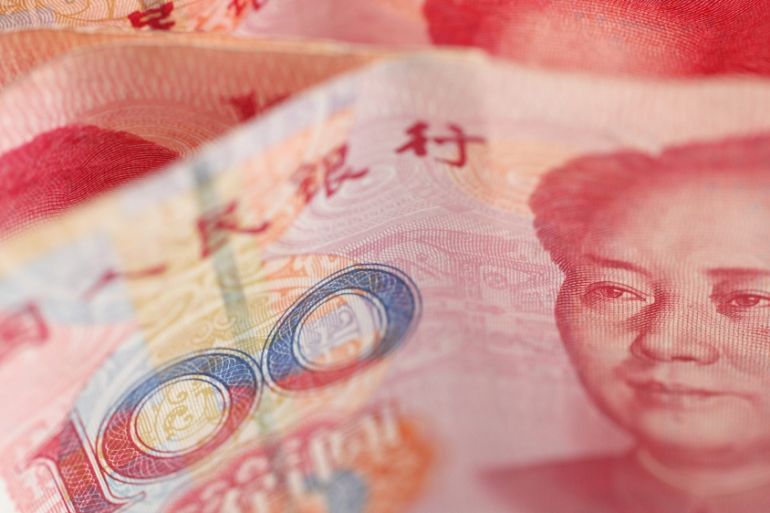China devalues yuan in controversial currency move
Decision could jeopardise China’s chances of seeing the yuan become a global reserve currency.

China has sharply devalued its currency in the face of a slowing economy, jeopardising its ambitions of having the yuan traded as a global reserve currency.
The central bank of China pushed the currency almost two percent lower on Tuesday, saying this was a “one-off devaluation”.
Keep reading
list of 4 itemsUS imposes new sanctions on Iran after attack on Israel
A flash flood and a quiet sale highlight India’s Sikkim’s hydro problems
Why is Germany maintaining economic ties with China?
The decision is unlikely to go down well with the US government, which has accused Beijing of manipulating its currency in the past to eke out an economic advantage for its exporters.
Beijing’s move came after the country’s exports fell 8.3 percent in July.
RELATED: China to prop up stock market after record fall
The move by the People’s Bank of China is also unlikely to be seen as a one-off, as attempts to move away from an export-driven economy have not delivered the desired growth.
“This is the perfect storm for China,” Rajiv Biswas, chief Asia Pacific economist at IHS, told Al Jazeera.
“Wages are rising in China, other currencies are depreciating and there’s sluggish global demand. China’s export sector is struggling. We expect the economy to slow by one percentage point from 7.4 percent last year to 6.5 percent this year.”
Official reserve status
Chinese President Xi Jinping’s efforts to open up the financial sector to competition have been undermined in recent months.
China was forced to intervene to prop up the stock market – after stocks crashed more than 30 percent in June – by spending about $147bn, according to US investment bank Goldman Sachs.
And now, efforts to shore up exporters cast doubt on whether the International Monetary Fund (IMF) will give the currency official reserve status.
China, while not attempting to topple the global dominance of the dollar, has been pushing to join a select group of currencies that are widely used to trade goods and services.
To do that, it needs to join the IMF’s Special Drawing Rights.
Xi is meeting US President Barack Obama in September, but with a presidential election in 2016, this could prove to be an uncomfortable visit.
“This issue will be a soft target in the lead up to elections,” Biswas said.
“China has been very cautious over the year. It’s kept the currency stable while many emerging market currencies have fallen sharply, that goes for the yen and the euro. All have depreciated against the dollar.”
“The IMF doesn’t believe the currency is undervalued. But we could see other currencies depreciate further, which isn’t going to help China,” he added.
“While the Chinese government remains committed to economic reforms that are essential for boosting long-term competitiveness, the timetable for some reforms may be pushed back due to the current cyclical economic downturn,” Biswas said.
“Goals such as capital account liberalisation and currency convertibility will likely be delayed due to fears of capital flight in the current economic environment, with Chinese FX [currency] reserves having already fallen from $3.99 trillion in June 2014 to $3.65 trillion in July 2015, a $340bn drop in just over one year. This drop in China’s FX reserves is almost equivalent to India’s entire FX reserves,” Biwas added.
“While China will continue to make a gradual transition from an economy driven by investment and exports towards an economy driven by domestic consumption, this transition will take many years, and during the current cyclical slowdown, the government is again having to resort to boosting public investment to try to stabilise the economy.”
Beijing’s intervention could trigger a so-called currency war in which other nations devalue their currencies. Commodity exporters like Brazil, Indonesia and Malaysia have seen their currencies hit multi-year lows as the price of oil and raw materials slump.
The currencies of many developing nations have already been under pressure as the US looks to raise interest rates later this year.